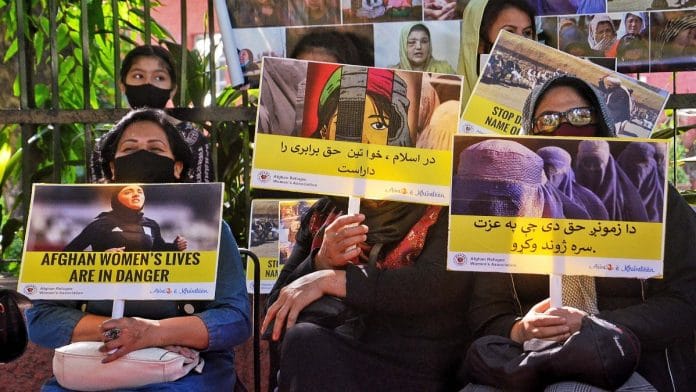New Delhi: Ever since the Taliban recaptured power last year, women across Afghanistan dreaded that their dreams would be crushed anytime. Their fears came true earlier this week when the Taliban barred them from higher education.
“No one in the world will be able to understand what Afghan girls are going through right now,” said a 22-year-old Kabul woman — one of the thousands of young women shut out of college.
“I wanted to go to Oxford and study economics, but one needs to clear the TOEFL (Test of English as a Foreign Language) for that. I was studying English in college so that I could clear the TOEFL. But after the Taliban ban, I am stuck at home. I wanted to make a change in the world…but all those plans have now been canned,” she told ThePrint over the phone.
“Though I really don’t know what I am going to do now, at least I got educated. My heart goes out to all those young women who have been denied this opportunity.”
Life has been difficult for Afghan girls under the Taliban regime, but the latest diktat has come as the last straw, she said, adding that other countries are not helping is only making things worse.
“The Indian government has stopped visas for Afghan students, and the Chevening scholarship is no longer available for Afghan women living in Afghanistan. European countries are also not accepting us…Instead of helping us at this time, other countries are being hostile, which is very disappointing,” said the woman.
The decision to bar women from universities was made by the Taliban’s Ministry of Higher education. Led by hardline cleric Nida Mohammad Nadim, a long-standing opponent of women’s education, the ministry earlier barred girls from attending high school, and also limited their choice for college-level subjects.
The United Nations recently reported that women’s access to healthcare, jobs and justice has been severely restricted in Afghanistan since the Taliban took over. The Taliban has also reinstated laws mandating that women wear the all-enveloping burqa.
Also Read: Volatile Pakistan-Afghanistan relations causing spike in terrorist attacks, civilian deaths
Future bleak
Women pursuing their degrees or had just joined college in September will now have to drop out in the middle of their course. Speaking to ThePrint over phone, some of these young women rued that the “Taliban took away their only hope”.
“I could not sleep the night the order came. It is disheartening for students like me. I wanted to get a PhD from a foreign university and come back to serve my country but now that seems like a distant dream,” said a 21-year-old, who was pursuing her Masters from Kabul University. She has had to drop out even as she hoped to pursue a PhD as well.
Speaking from Kabul, a third-year engineering student at the Kabul Polytechnic University revealed it was becoming increasingly unsafe for women to even step out.
“It is so hard to believe that they are doing this to us! Earlier this year, the primary schools were shut and now they have shut down universities,” she said, adding that “the future is bleak for the women”. “Girls are barred from entering schools and colleges… this is like throwing away all the progress that women’s rights movement in Afghanistan made in the last 20 years,” she said.
With no scope for education, she said, Afghan women will languish at home, and will become voiceless sufferers. “The Taliban took away our only hope.”
But not all women have given up. Mahera Rahimi, a recent law and political science graduate from the Azhar Institute of Higher Education, said while the situation has taken a turn for the worse, she hopes for a change. “The ban came as a shock to all professors and students. However, I strongly believe that this will change,” she told ThePrint.
Rahimi said all that the women in Kabul are left with is their voice to bring in a change in their favour. “Everyday there is a new group of women who take to the streets in protest and demonstration. While we expect international agencies to push for change, for now we are raising our voices to demand our right to education and work.”
She claimed that despite the women raising their voices regularly, the protests were not covered because of media censorship in her country.
Although women students have been protesting against the decision, the Taliban has used violence against demonstrators. The Pashto-language Radio Azadi recently reported that people were marrying off young daughters to avoid their forced unions with Taliban fighters.
In a report last month, Afghanistan experts Roxanna Shapour and Rama Mirzada wrote that new anti-women laws were “crushing their sense of self-worth education ban and shuttering future options for themselves, their sisters or daughters and for all women in Afghanistan”.
India condemns ban
In a briefing Thursday, the Ministry of External Affairs (MEA) expressed concerns over the reports of the ban on higher education.
“India has consistently supported the cause of female education in Afghanistan. We have emphasised the importance of the establishment of an inclusive and representative government that respects the rights of all Afghans and ensures equal rights of women and girls to participate in all aspects of Afghan society, including access to higher education,” MEA spokesperson Arindam Bagchi said.
After the Taliban takeover of Afghanistan in August last year, universities were forced to implement new rules, including gender-segregated classrooms, and asking women to wear abaya robes and a garment covering most of their face.
(With inputs from Pia Krishnankutty)
(Edited by Smriti Sinha)
Also Read: Taliban stands divided. Why it has implications for the world and India






